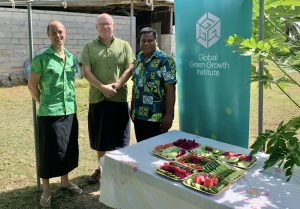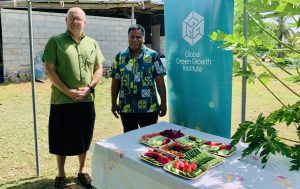 Tarawa, Kiribati, Tuesday June 15th, 2021 – The governments of Kiribati and New Zealand, and development partner the Global Green Growth Institute (GGGI), today launched the regional Low Emissions Climate Resilient Development (LECRD) program in Kiribati. Under the LECRD project, Kiribati’s Ministry of Environment Lands and Agricultural Development (MELAD) with support from GGGI, will develop a comprehensive Action Plan to implement the Kiribati Agriculture Strategy that was adopted in 2020.
Tarawa, Kiribati, Tuesday June 15th, 2021 – The governments of Kiribati and New Zealand, and development partner the Global Green Growth Institute (GGGI), today launched the regional Low Emissions Climate Resilient Development (LECRD) program in Kiribati. Under the LECRD project, Kiribati’s Ministry of Environment Lands and Agricultural Development (MELAD) with support from GGGI, will develop a comprehensive Action Plan to implement the Kiribati Agriculture Strategy that was adopted in 2020.
Agriculture in Kiribati is a sector directly impacted by the effects of climate change. Salt-water intrusion leading to decline in soil and water quality, combined with changes in rainfall patterns all threaten agricultural production in Kiribati.
To address these challenges and develop a sustainable agriculture sector, Honorable Minister Mr Ruateki Tekaiara, Minister of MELAD together with New Zealand High Commissioner Mr Paul Wallis, rolled-out the LECRD program which aims to develop sustainable strategies and plans that support climate mitigation and resilience actions.
As the Honorable Minister Tekaiara said, “We see LECRD as an opportunity to take the key priorities from the Agriculture Strategy, and turn them into projects that will have a positive and lasting impact on peoples’ lives in Kiribati”.
The launch was held in Tobwakira Agricultural Farm, Bikenibeu, South Tarawa, and showcased many of the crops under production by the Agriculture and Livestock Division, MELAD. The LECRD is funded by the New Zealand Ministry of Foreign Affairs and Trade and implemented in Kiribati by MELAD with support from GGGI.
This partnership between MELAD, New Zealand and GGGI, will further strengthen the Agricultural Sector and improve sustainable livelihoods, food security, health, and nutrition in Kiribati. It also underscores the continued commitment toward building a low emissions and climate resilient economy in Kiribati that will create opportunities for those impacted most by climate change and the Covid-19 pandemic.
HE Paul Wallis pointed to New Zealand’s development cooperation values of social (people – Ngā Tāngata), environment (planet – Te Taiao), economic (prosperity – Te ōhanga), and stability and governance (peace Te Rangimarie) pillars of sustainable development. “In partnership with GGGI, New Zealand is helping Pacific Island Countries to lead their climate change responses by supporting strengthened capacity for effective low-emission, climate resilient planning. We are delighted to support the Ministry and GGGI develop an Action Plan to operationalise the Agriculture Strategy.”
The Kiribati Agriculture Strategy highlights the need for targeted actions to improve agricultural production in Kiribati. Developed with support of GGGI, the Agricultural Strategy makes the linkages between agriculture, food security, livelihoods, health, and nutrition in the context of climate change related impacts.
“GGGI is committed working with Kiribati and likeminded partners to identify and implement green growth solutions that bring tangible benefits to the I-Kiribati peoples, and contribute to a low emissions and climate resilient Pacific region,” said Daniel Muñoz-Smith, GGGI Country Representative for Kiribati.
Kiribati is a founding member of GGGI, and as supported the organization’s country program since 2017.
The LECRD program is a regional collaboration between GGGI, the New Zealand Ministry of Foreign Affairs and Trade, and target Pacific Island Countries (PICs). The LECRD program supports PIC to develop policy, legislation, regulations, standards, strategies, roadmaps, and investment plans that backstop an enabling environment for increased green investment and impactful climate action.
In addition to Kiribati, GGGI is delivering the 3-year program in Fiji, Papua New Guinea, Tonga and Vanuatu.
About the Global Green Growth Institute (GGGI)
Based in Seoul, GGGI is an intergovernmental organization that supports developing country governments transition to a model of economic growth that is environmentally sustainable and socially inclusive. GGGI delivers programs in more than 35 Member and partner countries with technical support, capacity building, policy planning & implementation, and by helping to build a pipeline of bankable green investment projects. More on GGGI’s events, projects and publications can be found on www.gggi.org. You can also follow GGGI on Twitter and join us on Facebook, YouTube and LinkedIn.
Ross Craven
Project Manager
ross.craven@gggi.org
(GGGI Seoul HQ)
HeeKyung Son, Communications Lead
+82 70-7117-9957
H.Son@GGGI.org